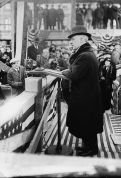
Courtesy: Wikipedia via Library of Congress
New York City was hopping in the fall of 1928. Like New York City could ever stand still. But for some reason this autumn was particularly frenzied. Al Smith, the New York born and bred governor of the Empire State, lost his bid for the presidency. Smith was Catholic, he was against Prohibition and the U.S. economy was booming. Smith was doomed. Out of the 531 electoral votes, he only garnered 87. Herbert Hoover won in a landslide—Prohibition was here to stay.

Courtesy: Biography.com
My friend Mark Hellinger took it in stride. He had so many other things to write about in his daily and weekly columns in the Daily News. Hellinger spent a couple of weeks on vacation that season. It was no ordinary vacation—he was traveling with celebrity newlyweds Al Jolson and Ruby Keeler.
According to Hellinger’s biographer, Jim Bishop, the notorious Jack “Legs” Diamond tried to shake down Jolson before the wedding for the sum of fifty thousand dollars. Hellinger stepped up to the plate and intervened on Jolson’s behalf with some of his more unsavory underworld contacts. As a result of his meddling, Diamond told Jolson that he was just kidding. Jolson was off the hook and the wedding went on as planned. Mark Hellinger was not only asked to be Jolson’s best man, but was invited to go on their Honeymoon trip to Paris and London. Professionally–Hellinger got the wedding exclusive for the Daily News–at least until the other papers could verify the information.
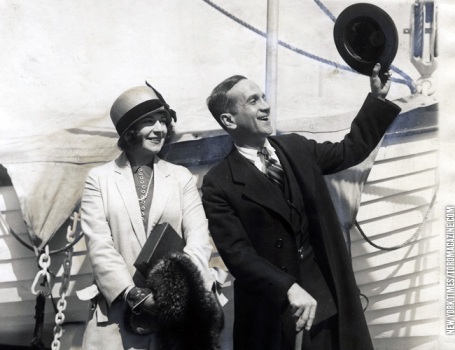
Gladys Glad, Hellinger’s girlfriend, chuckled at the thought of him being the third wheel on a wedding trip. But he thought it was an honor and planned to file a couple of columns from his trip. Alas he disliked the European cities and felt trapped on the ship. The bars closed way too early on board—eleven o’clock. Hellinger was definitely out of his element. Plus he caught a persistent cough that didn’t clear up for weeks.
Almost as soon as he returned to the States, Arnold Rothstein, the man who is considered to be both the brain and the financier of the bootlegging trade, was gunned-down. Broadway was a-buzz. My fellow blog-ster at Infamous New York has a very interesting account of his death, it’s worth a read.
Mark Hellinger devoted space in a number of columns to the legacy of Arnold Rothstein. Rothstein, Hellinger penned, loved to lend money—fifty dollars to five thousand dollars. But the loan had to be paid back at the date and time stipulated…or else. If the payment did not materialize as agreed, Rothstein would call the debtor and, as Hellinger wrote, “he has given many a man a jumpy heart” during those calls.
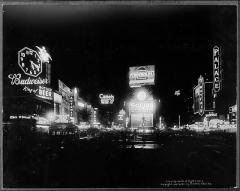
Courtesy: Library of Congress
There was a Broadway sensation called Abie’s Irish Rose that closed in 1927 after 2,327 performances. It was, at that point in time, the longest running Broadway play. According to Hellinger, Anne Nichols, the writer could not get the necessary financing and finally went to Rothstein. He wrote her a check for ten thousand dollars and she was on her way to success. Before she left his office, she asked him if he would like a piece of the show, his response–No, just pay me back. I wouldn’t want to take that type of gamble.
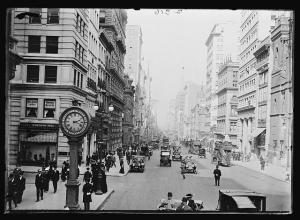
Courtesy: Detroit Publishing Company Photograph Collection via Library of Congress
But…Rothstein was a gambler. According to Hellinger he would bet on anything. He wrote that before E. M. Fuller was disgraced and hauled off to Sing Sing, Rothstein and Fuller would take walks (the details on Fuller’s financial dealings, are way too complicated–but he and his partner, McGee, were basically that era’s Bernie Madoff). As they walked, the two would supposedly bet if the last number of a license plate was odd or even. Rothstein, Hellinger wrote, would push for a Fifth Avenue walk and bet even on the buses. He won every time—he knew that all Fifth Avenue buses ended in zero.
It sounded fishy to me as well—I couldn’t let it go—I did some research.
Rothstein did have to testify in Fuller’s 1923 bankruptcy trial and refused to answer the question posed to him on whether he had won $385,000 in bets from Fuller. Responding to such a question, Rothstein reasoned, might incriminate him, as gambling was a misdemeanor. I don’t know–they must have taken many, many walks or Fuller must have been an incredible chump to lose that kind of change.
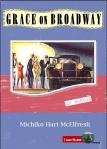
More on all of these subjects later—[deep sigh]—what an incredibly interesting era…
So Interesting I wrote a novel about it.

As always, interesting tidbits of information on characters from the past. I can see educators supplementing Common Core Learning Standards with your blogs. The content is sure to hook the young reader. The photos serve as the authentic documents needed to support CCLS research projects.
Thanks. I have so much fun writing them–but finding the photos is like going on a treasure hunt and I can’t wait to find something interesting.
Great post! If you haven’t already read it, Jerome Charyn’s Gangsters and Gold Diggers is a fantastic read on the history of Broadway during prohibition
Just ordered it–thanks!